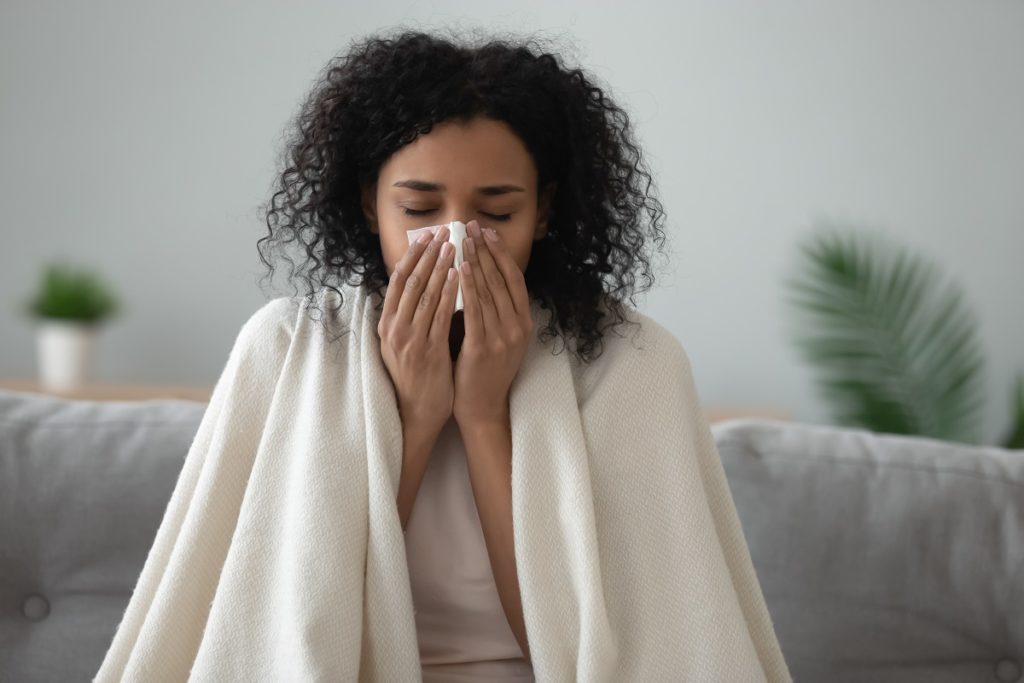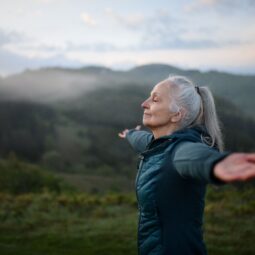Insights from Ann Marie Paulsen, MD, internal medicine physician at The Portland Clinic.

Q: I’m having virus symptoms. How can I tell whether it’s a cold, flu or COVID-19?
Any of these viruses may cause coughs, fevers, body aches, respiratory issues, gut issues and other symptoms. Because of their similarities, it can be hard to tell which virus you have, especially in the first few days, without testing. But there are some differences that may offer clues:
In COVID-19:
- Symptoms tend to be milder in the first few days and to increase in severity by days 5-9.
- The cough tends to be dry.
- Shortness of breath can be profound and notable just walking across the room.
- Red eyes and a loss of the senses of smell and taste are distinguishing symptoms of COVID-19.
In the flu:
- Illness tends to come on suddenly, with significant symptoms on days 1-4 of infection.
- People often can remember the exact hour when their headache and fever developed.
In the common cold (which can be caused by a variety of respiratory viruses):
- Onset is usually gradual.
- In addition to coughing, colds are marked by sneezing and a stuffy, runny nose, which are less common in COVID-19.
- Fever and shortness of breath are rare.
Q: If I’m not sure, what should I do?
COVID-19 is a serious and highly contagious viral illness that can have grave consequences for anyone who contracts it, but particularly for the elderly and people with certain health risks. It is critical that we all do our part to protect vulnerable people in our communities from contracting this virus. Even if you think it’s just a cold or the flu (which can be deadly for the elderly, too, by the way), now is the time for an abundance of caution.
- If you think you could have COVID-19, and you share a household with others, stay in a room that no one else enters. They can leave food and water at your door. Mask when you go to the bathroom, and disinfect the bathroom after you use it. Don’t go out in public (except to get tested) until:
- 10 days have passed since symptoms started, and
- You’ve had no fever over 100F° for 24 hours (without using fever-reducing medications), and
- Your symptoms are improving
- Even if your symptoms are more likely due to a cold, do everything you can to prevent its spread and reduce COVID-19 alarms in others.
- Wash your hands often with soap and water for at least 20 seconds, or clean them with hand sanitizer that’s at least 60% alcohol.
- Try not to touch your eyes, nose or mouth.
- Cough or sneeze into a tissue or your elbow, and wash your hands afterward.
Q: How should I treat my symptoms and care for myself?
Regardless of which one you have, treating a respiratory virus is mainly about self-care, unless you require hospitalization. Medications and measures that help alleviate symptoms include:
- Acetaminophen (Tylenol)
- Nasal saline followed by nasal steroid spray twice daily
- Honey to calm a cough (but don’t give it to infants younger than one year old)
- Fluids
- Rest
- Time (2-6 weeks)
The jury is still out on whether supplements such as zinc, vitamin C, vitamin D, and melatonin will help with symptoms, but it’s not harmful to try them.
In addition, if you have flu symptoms, your health care provider may recommend Tamiflu, but for the best benefits, it must be started within two days of symptom onset.
Q: When should I call a doctor?
Seek emergency medical care for any of these symptoms:
- Trouble breathing (e.g., you’re unable to walk across a room)
- Persistent pain or pressure in the chest
- New confusion
- Inability to wake or stay awake
- Bluish lips or face
For less-severe symptoms, it’s a good idea to alert your health care team that you’re not feeling well so they can provide advice that’s tailored to your health conditions and can monitor you carefully.
Q: Does any of the above change for children?
These viruses are tough to distinguish in children, too. Many kids who contract COVID-19 have only mild symptoms, or none at all, but they still can transmit the virus to adults, so following preventive guidelines is just as important for them. Monitor sick kids for the emergency symptoms above, as well as intense abdominal pain or inability to keep liquids down, and get them to a doctor or hospital quickly if these symptoms arise.
Q: When should kids be kept home?
Daycares are asking that children remain home if they exhibit any cold symptoms, particularly if they have a fever. When schools reopen, follow their guidance.
Q: If I think I have COVID-19, is it important to get tested to find out for sure?
It’s helpful, but tests aren’t always available, and they aren’t perfect. A negative test doesn’t completely rule out the infection, so continue to practice handwashing, masking and distancing measures even if your test is negative. If your symptoms are mild and testing supplies are short, your provider may recommend home isolation and supportive measures without testing.
Q: What are the most effective ways to prevent all three of these viruses?
If there is a small silver lining here, it’s that all of the precautions we already take to prevent COVID-19 — masking, distancing and handwashing — will also reduce our chances of catching a cold or flu this season. (That said, flu shots are strongly advised this year.)
Q: Any encouraging words as we head toward the end of this unusual year?
Although we’ve faced much uncertainty this year, we have learned a lot about this emerging virus. We’ve found innovative new treatments that may help those who become seriously ill. And scientists are working diligently toward vaccines. Until these become available, we should do all we can to keep ourselves healthy by eating nutritious foods, drinking plenty of water, getting regular physical activity, and making time for rest and sleep. And keep up the handwashing, masking and distancing — they will pay off if we don’t let our guard down.


